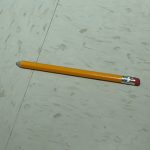Fiction Editor Michael Griffith on choosing Carey Cameron’s “Thursday”:
“Thursday” takes up—in subtle, touching, psychologically acute ways—a subject that seems to get relatively little attention in literary fiction: the slippages and frailties of late middle age, the tectonic grindings and intricate negotiations necessary to long marriage. It’s a sharp, smart story, tender but resolutely unsentimental.
 Carey Cameron: You write about what you know, and I wrote “Thursday” because I have a family member dealing with hearing loss, and a family dealing with that family member’s hearing loss. I searched a couple of times on the internet for help—literature, groups—for the families of those experiencing hearing loss—a kind of Al-Anon, but for hearing-loss-affected families—but found nothing. Maybe I was simply not adept enough at searching on the internet, but it led me to want to write something inspired by my family’s experience in the hopes that it might resonate with others. There are a lot of baby boomers out there struggling with hearing loss and other “ordinary” problems of aging, which, however, require extraordinary adjustments.
Carey Cameron: You write about what you know, and I wrote “Thursday” because I have a family member dealing with hearing loss, and a family dealing with that family member’s hearing loss. I searched a couple of times on the internet for help—literature, groups—for the families of those experiencing hearing loss—a kind of Al-Anon, but for hearing-loss-affected families—but found nothing. Maybe I was simply not adept enough at searching on the internet, but it led me to want to write something inspired by my family’s experience in the hopes that it might resonate with others. There are a lot of baby boomers out there struggling with hearing loss and other “ordinary” problems of aging, which, however, require extraordinary adjustments.
Cameron is the author of Daddy Boy (Algonquin, 1989) and Cuba Diaries: An American Housewife in Havana (Algonquin, 2002, published under the pseudonym “Isadora Tattlin”).
Poetry Editor Don Bogen on choosing Emily Hipchen’s “Boy into Polished Concrete”:
“Boy into Polished Concrete” struck me at first reading by its command of music and structure. The stanzas each have a clear focus as the poem progresses from the schoolroom, to the test, the boy going to bed, and his feelings in bed; and the whole poem is framed brilliantly by the far-away galaxies we cannot see at the start and the close-in memory of the spiral “galaxy” of spilled milk at the end. That milky way spills out as a fluid play on blank verse in the last line, a subtle and effective contrast to the rattling, consonant-laden phrases that express the boy’s anxiety at the start. The craft here is both noteworthy in itself and seemingly natural to the scenes described.
Great craft alone, of course, does not make a poem, but in the case of “Boy into Polished Concrete” it builds an intimate and persuasive character study. I’m impressed by the way the boy’s distinctive integrity grows even as we get closer and closer to his inner thoughts. This poem brings us inside the boy’s world—and his family’s too—with insight and grace. It’s a rich and deeply moving piece of work.
Emily Hipchen: “I just hit things,” my friend said, “hard. Like in football. And for a split second I could think.” He took a sip of beer; I frowned. “Look,” he said, “It’s a cognitive disorder. This is what we had to do: my son’s teachers thought that children needed to sit still to take tests. My son needs to throw himself on the floor. Over and over.”
 This is where the poem came from—my trying to understand what that must be like for my friend and his son—but more generally what the relationship is between knowledge and the floor, and the motion of falling to the floor, and the point in that gesture at which knowledge becomes accessible, and why that place? It’s not like I got answers over the raft of revisions I did (the only original line here is the title), which makes all the periods in this version look really bizarre to me. I just had the questions, and this picture in my head of the boy, his fat pencil, the test, the floor; his father, his mother; the way the noise in his head must be like watching a badly-tuned television. The way my father used to pound the side of ours to fix it, which did fix it, most of the time.
This is where the poem came from—my trying to understand what that must be like for my friend and his son—but more generally what the relationship is between knowledge and the floor, and the motion of falling to the floor, and the point in that gesture at which knowledge becomes accessible, and why that place? It’s not like I got answers over the raft of revisions I did (the only original line here is the title), which makes all the periods in this version look really bizarre to me. I just had the questions, and this picture in my head of the boy, his fat pencil, the test, the floor; his father, his mother; the way the noise in his head must be like watching a badly-tuned television. The way my father used to pound the side of ours to fix it, which did fix it, most of the time.
Hipchen is a Fulbright scholar, the editor of Adoption & Culture, one of the editors of a/b: Autobiography Studies, and the author of a memoir, Coming Apart Together: Fragments from an Adoption (2005). Her essays, short stories, and poems have appeared in Fourth Genre, Northwest Review, Arts & Letters, and elsewhere. She is an associate professor at The University of West Georgia.










